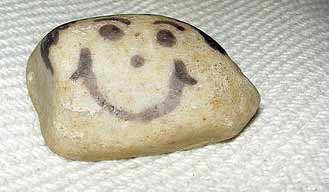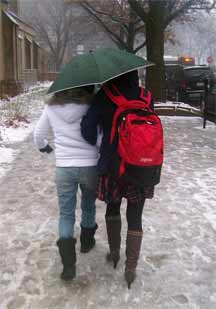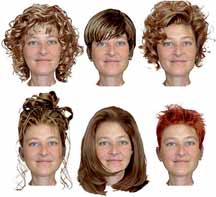What if you violate the fine print?
Prize | Chances |
|---|---|
Washer-dryer |
5% |
Toaster Oven |
10% |
Tropical Getaway |
1% |
Pet Rocks |
84% |
Here is the original table of probabilities. You can see that the chance of winning a major prize (washer-dyer, toaster, or getaway) = 16%.
Let's say we want to figure out the chance that you will win an appliance OR a major prize.
If you blindly apply the Law of OR, you would write:
P(major prize OR appliance) = P(major prize) + P(appliance) = 16% + 15% = 31%.
Pretty good odds! But don't get too excited yet. The problem is that we "double-counted", because your chances of winning the toaster or the washer-dryer both got counted twice! Really, your chances should be:
P(major prize OR appliance) = P(getaway OR appliance) = 1% + 15% = 16%.
 In
fact, there is a rule that allows you to correct for the effect of double-counting,
but we're not going to go into it here -- and in any case, you can only use
it if you know how much double-counting is happening.
In
fact, there is a rule that allows you to correct for the effect of double-counting,
but we're not going to go into it here -- and in any case, you can only use
it if you know how much double-counting is happening.
In general, though, if two probabilities are not mutually exclusive, you can't add them, which means you can't figure out the probability of one event or the other. Sorry!
Can you determine the probability that one OR the other  event will occur,
using the information given?
event will occur,
using the information given?
the chance of rain or snow tomorrow,
given that P (rain) = 10% and P (snow) = 1%
(To make this problem interactive, turn on javascript!)
- I need a hint ... : the chances of rain and snow are not mutually exclusive
- ...another hint ... : it could be both
I think I have the answer: we can't say anything
 the likelihood that you left your keys
the likelihood that you left your keys
in your pocket or your backpack,
given that P(pocket)=10% and P(backpack)=80%
(To make this problem interactive, turn on javascript!)
- I need a hint ... : keys can be in one place, so we can use the Law of OR to get P (in pocket OR in backpack)
- ...another hint ... : 10% + 80%
I think I have the answer: 10% + 80% = 90%

the probability that your father or your mother has curly hair,
given that the probability of curly hair in a population is 30%
(To make this problem interactive, turn on javascript!)
- I need a hint ... : its possible that both of your parents could have curly hair
- ...another hint ... : these options are not mutually exclusive
I think I have the answer: we can't say anything
Copyright University of Maryland, 2007
You may link to this site for educational purposes.
Please do not copy without permission
requests/questions/feedback email: mathbench@umd.edu